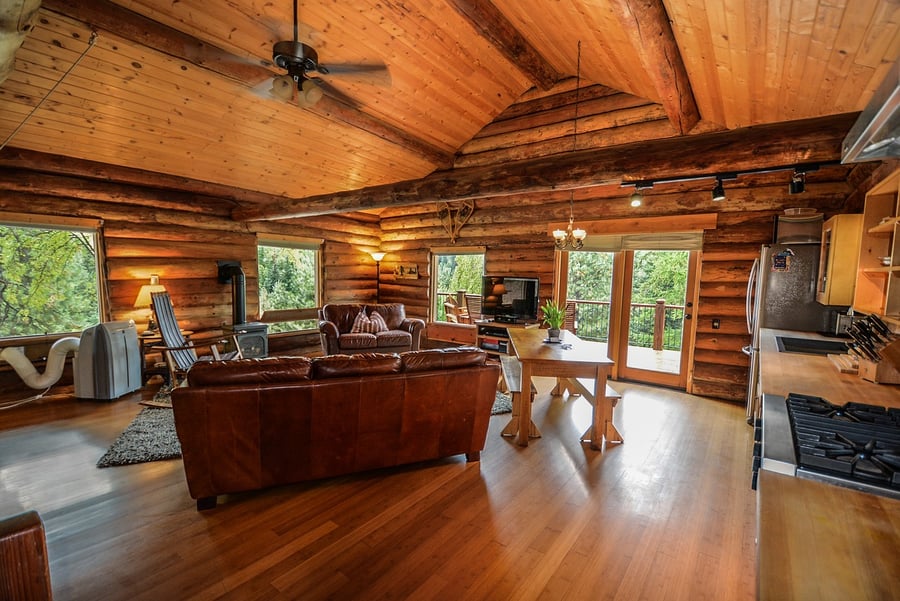What to Know About Renting Out Your Home During the Holidays
Did you get lucky in the PCS lottery? Are you living somewhere warm and sunny or in a place full of life and iconic landmarks? If you did score an ideal locale, there’s a good chance that, if you’re happy in your new location, other travelers (maybe even other military families) will be interested in paying for a short stay in your home.
Statista reports that after seven consecutive years of growth, the vacation rentals segment of travel and tourism in the U.S. will increase to nearly 63 million users between 2023 and 2027. The short-term rental market is here to stay.
Remote work remains steady for potential renters, and more and more homeowners are looking for ways to earn extra cash, especially during peak vacation weeks, by renting out spare rooms, in-law suites, or possibly the whole house. Military families with available space could jump on this trend as we are known to “go home for the holidays.”
If rental income interests you, you’re not alone. But before handing strangers the keys to your home, consider some of the practical issues that need to be addressed first.
How Do You Feel About Personal Space?
Depending on your availability, some, if not all, of your home will be open to unfamiliar people. Unfamiliar people bring unfamiliar “normal to them” ways of life. Shoes on the coffee table, dinner eaten on the couch, and wet towels on the floor could all be perfectly acceptable behavior in their home, but are you okay with these habits in yours?
Before your first guests arrive, you’ll need to assess what items could be lost to accidents or theft. Packing away personal treasures, such as pictures and family heirlooms or your expensive Japanese cooking knife and favorite cashmere sweater, takes a top spot on the what-to-do list. Next, decide which doors and cabinets should be locked or if you should purchase a safe.

Photo from Canva
Although most mail is junk these days, it could prove too tempting if delivered to your home, allowing renters to snoop through, lose, or accidentally discard it. If renting space becomes a business, become friendly with your local post office and delivery person. They’ll help you keep tabs on the dates to hold and stop mail. USPS online has the option to stop and start mail, but be diligent with follow-through. You can hold mail for up to 30 days per request.
Even short-term renters need boundaries. Be very clear about personal items or areas of the house that are off-limits. Rules concerning overnight guests and large parties are popular topics to discuss with potential renters. Homeowners often write these stipulations in a legal contract, such as a lease or rental agreement.
If none of these invasions of privacy bothers you, maybe a long-term renter is an option. Check out 6 Things to Consider Before Renting Out a Room in Your Home.
Legal Limits of Short-Term Rentals
The vacation rental industry is growing so rapidly that laws pertaining to renting your home short term may not exist in smaller locales, but large military towns and tourist draws such as Washington, DC; San Diego, California; and Honolulu, Hawaii, have scrambled to get local legislation created to manage the business of high turnover rentals. Not to mention creating laws on how local governments can cash in on permits and rental-specific taxes.
You'll need to research local and state laws and comply with them. Some locations simply require paid permits, while others mandate inspections and improvements for fire escape routes, carbon dioxide detectors, etc. Assume there is a wide range of compliance expectations.

Photo from Canva
How Will Your Neighbors and HOA Feel About Your Rental?
Love them or hate them, homeowners associations have plenty to say about short-term rentals based out of your home. Start attending meetings and reviewing established regulations regarding rental space before welcoming your first guests. And don’t try to hide your guests from your neighbors. They’ll quickly know what is happening and report any long-term guests that aren’t legal.
Even if your neighborhood welcomes rental businesses, the right thing to do to keep your business afloat and maintain neighborly kinship is to be transparent. Be forthcoming with the dates you’ll be gone and how you can be reached if any of your guest’s behavior becomes egregious. Assure neighbors that excess trash, reduced parking on the street, and other nuisances have an action plan for correction.
Best Business Practices for Your Short-Term Rental
When you picture renting out your house as a short-term rental, is it occasionally for family and friends, or is this venture a money-making business? The answer determines how much time, money, and energy is needed to prepare your property.

Photo from Canva
Use a Legal Agreement
Tenants and homeowners must sign legal rental agreements containing general and specific stipulations. Homeowners have little recourse if tenants agree to a verbal transaction and later violate it. MilitaryByOwner's partner, US Legal Forms, offers state-specific rental agreements.
Marketing Your Short-Term Rental
Where will you list your space for rent? Each avenue has pros and cons. The big companies have a more extensive reach but require fees. DIY ads on local online publications and group pages keep more money in your pocket but demand more work. You are responsible for managing phone calls, loading pictures, and processing paperwork.
Your rental business will need a marketing plan, starting with photography. Quality photos of the listed property will give you the most bang for your buck. You can woo renters with high-end pictures (possibly from a professional) and clean staging techniques. Never photograph and publish dirty kitchens or bathrooms; always use the best lighting possible. Investing in solid photos early on could reap major rental income later.
Marketing plans extend into the house through small and large amenities offered to guests. If you hope to receive positive reviews as a host, you must consider ways to go above and beyond your competitors. Guests welcome information on local attractions, sought-after dinner spots, and coffee houses, as are instructions on anything that needs a code or lock. A treat such as cookies or chocolate makes for a memorable stay.
Pricing Strategies, Insurance, and Background Checks

Photo from Canva
Learning to set a realistic price for your rental space is challenging, especially for first-timers. Gauging the rental market takes some digging. Start with the big names, like VRBO and AirBnB, and see how much your neighbors charge, especially during peak holidays.
Make your adjustments according to the size of the rental space and the amenities included.
You likely have homeowners insurance, which is a good start, but it probably doesn’t cover renters or the damage they can cause to your house. Check in with your insurance company to identify extra costs for renters insurance. Illegally housing renters could nullify parts of your current homeowners policy. Protecting your home and your assets is a top priority and ties back to the legal responsibilities noted earlier.
Depending on the length of stay, some homeowners feel comfortable running background checks on potential renters. This may not be necessary for short stays, but it is an option. Research online platforms, such as other vacation rental sites, to read reviews about the renter’s past visits to different homes.
Utilizing a Property Manager for Your Short-Term Rental

Photo from Canva
If all of these details have you feeling overwhelmed, there is a solution. Hiring a property manager could relieve you of the burden of all of the administrative and marketing tasks. But they come with a cost (around 10-15% of each booking), and their fees must be figured into the overall budget to determine if renting short-term is worth your efforts.
Full service managers handle every detail of the process, from loading pictures to communicating with renters and scheduling cleaning services after the guests depart. During the vetting process of selecting possible property managers, clearly express that yours is not a full-time vacation rental and will have restricted availability, mostly around holidays. Some companies won’t find value in occasional renters.
Here’s help for finding a reliable property manager: What to Know About Hiring a Property Manager.
Thoughtfully consider your real expectations of your time away from your home. Is it every December and July? Or just two weeks over spring break? Military families should also factor in their military lifestyle schedule. Could a six-month deployment mean the spouse moves home temporarily, leaving the current house open and available to rent? An extended TDY offers the same possibility. Your calendar truly dictates if short-term rentals are a viable option, given the amount of preparation necessary to make the transactions profitable.
We here at MilitaryByOwner offer homeowners considering renting some or all of their property dozens of resources to make the transition seamless. Start with our resource library on property management, and then grab our free resource below created especially for military landlords, by military landlords!






